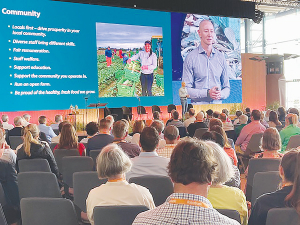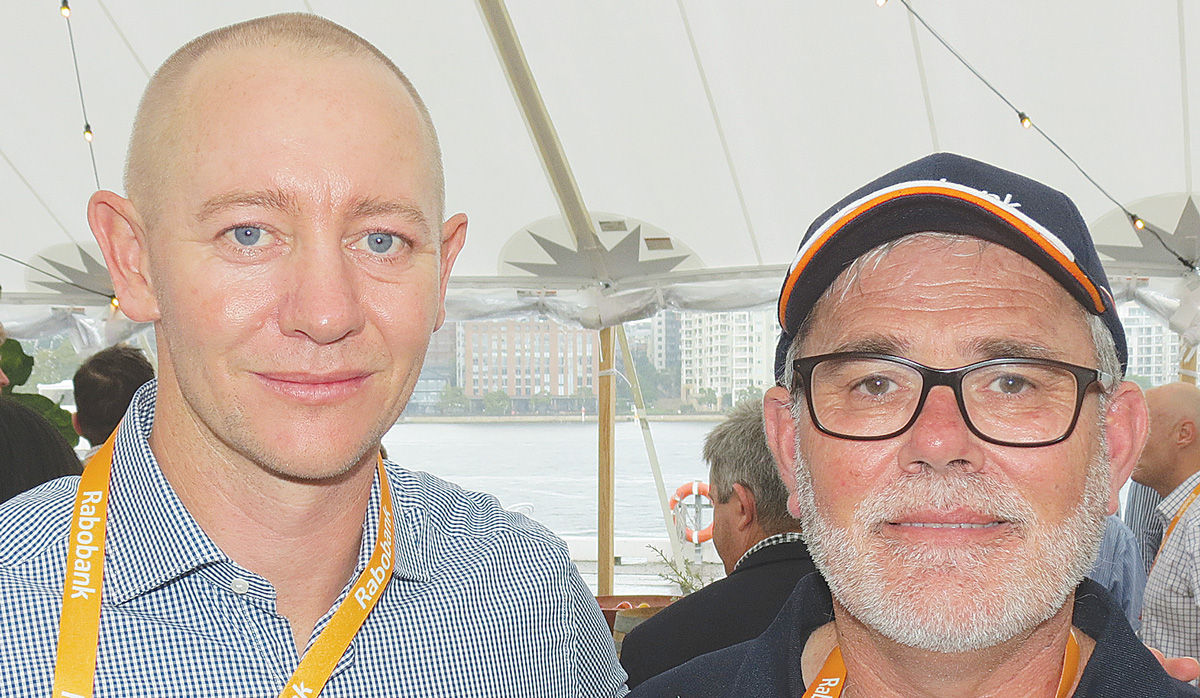Farmer confidence dips slightly, but positivity still dominates
Farmer confidence has taken a slight dip according to the final Rabobank rural confidence survey for the year.
 Jay Clarke giving his presentation on the sustainable practices of his company Woodhaven at the Rabobank agricultural symposium in Sydney last month.
Jay Clarke giving his presentation on the sustainable practices of his company Woodhaven at the Rabobank agricultural symposium in Sydney last month.
One of NZ's largest commercial vegetable growers says NZ can't have piecemeal regulations that differ from region to region.
Jay Clarke is director of the family-owned commercial growing business Woodhaven in the Horowhenua, which was started by his father John.
Clarke was a keynote speaker at Rabobank's recent agricultural symposium in Sydney, which attracted more than 1,600 people from Australasia.
His presentation on the sustainable practices of his company Woodhaven attracted a lot of positive feedback from delegates at the event.
Clarke told Hort News he loved the event and it was great to meet a number of talented people from around the world and hear their perspectives. He was also pleased with the response to his address.
He says, at present, NZ has a variable regulatory approach between regions and that this needs to change.
"You have got a situation where a huge proportion of the vegetable production in the Horizons region is essentially illegal - it requires a consent and there is no pathway for a consent at the moment," Clarke told Hort News.
"But there are other regions like Northland where there is no regulatory requirement whatsoever - so there is a lot of difference. As an industry we want to see that tidied up and see nationally consistent pathways that enable more healthy food production."
 |
|---|
|
Woodhaven director Jay Clarke and manager Shane Richardson at the Rabobank agricultural symposium in Sydney. |
Clarke says few people argue about the direction taken in terms of sustainability but believes there is some valid debate about how things might change in terms of farm systems. He says times are changing and while the cost of vegetables will come down, the days of a 99 cent lettuce are gone forever.
Clarke says the cost base for the producer has moved too much and it's unsustainable for companies like his to sell at very low prices. He told the conference vegetable production is largely a domestic industry in NZ.
"It's quite remarkable that all the veggies sold in NZ are produced on just 0.01% of the available agricultural land."
Clarke says the family company Woodhaven has invested heavily in providing quality incentives for staff - including scholarships. He says this is for good reason as crops need good skilled people to harvest them - especially with the type and perishability of the crops Woodhaven produce.
The World Wide Sires National All Day Breeds Best Youth Camp Best All Rounder plaudit has become family affair, with 2026 Paramount Cup winner Holly Williams following in her sister Zara's footsteps.
DairyNZ is giving New Zealand farmers a unique opportunity to gain hands-on governance and leadership experience within the dairy sector.
Herd improvement company LIC has posted a 5.2% lift in half-year revenue, thanks to increasing demand for genetics.
According to the latest Fresh Produce Trend Report from United Fresh, 2026 will be a year where fruit and vegetables are shaped by cost pressures, rapid digital adoption, and a renewed focus on wellbeing at home.
The Roar is a highlight of the game hunting calendar in New Zealand, with thousands of hunters set to head for the hills to hunt male stags during March and April.
OPINION: The past few weeks have been tough on farms across the North Island: floods and storms have caused damage and disruption to families and businesses.